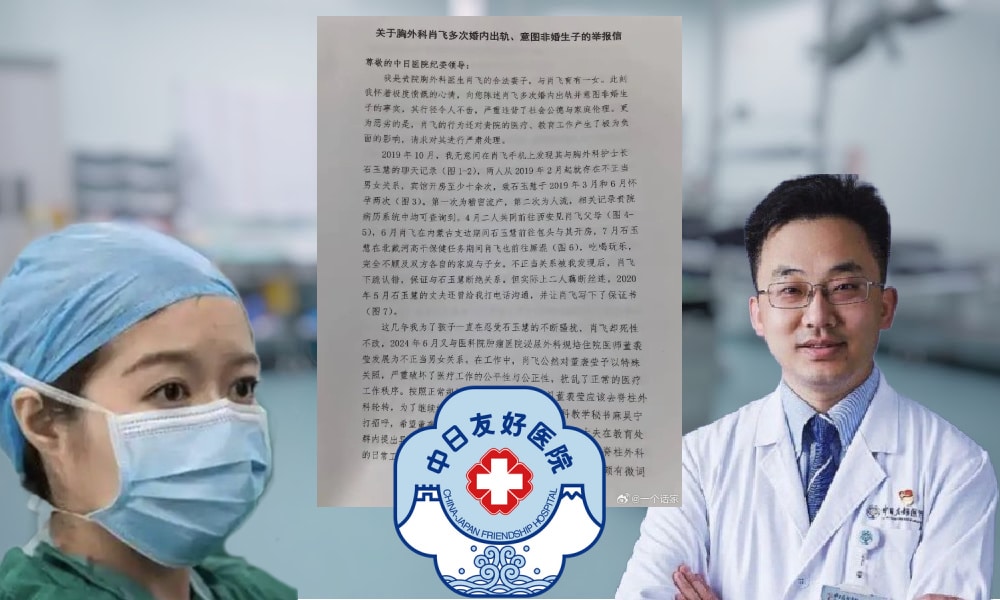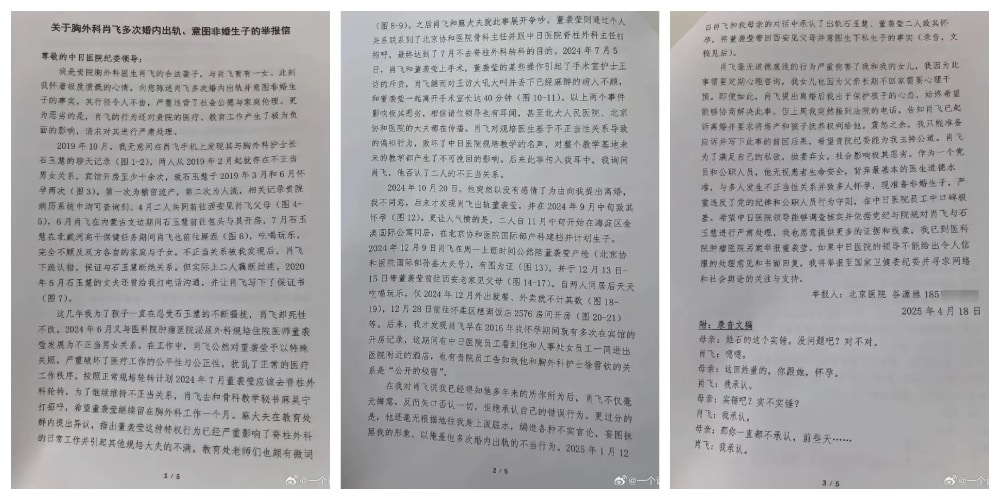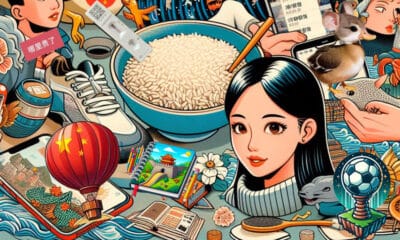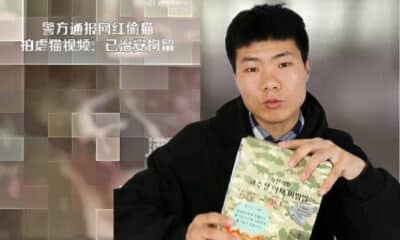Most Read
GOBI HAS BEEN FOUND! – Marathon Runner Finds Back Dog in Urumqi
It was the news everybody was hoping for. Gobi, the desert dog that joined Australian runner on his marathon across China and went missing before he could be adopted, has been found back after a long search in the city of Urumqi, China.
Published
9 years agoon

It was the news everybody was hoping for. Gobi, the desert dog that joined Australian runner on his marathon across China and went missing before he could be adopted, has been found back after a long search in the city of Urumqi, China.
The story that melted netizens’ hearts this summer was that of runner Dion Leonard who found a true friend in a little stray dog during his participation in the Gobi March of 2016.


The stray dog joined the runner on his run after he hung around the runners’ camp on the first day of the march. The two became inseparable after running for days on end together. The love grew so big that Leonard decided to set up a crowdfunding campaign to cover the costs for bringing the dog he named Gobi back with him to Scotland, where Leonard resides.
But during the first period of quarantine in the city of Urumqi, Gobi unexpectedly run away and went missing. Leonard did not hesitate and flew to China to look for his friend. The search started on August 15 and continued for nine days, with chances and hopes of finding the little stray dog growing smaller every day. Leonard and his helpers asked the help of Weibo netizens, who also spread the news about the missing dog.
Today Leonard and his search team announced on the Bring Gobi Home Facebook page that Gobi had been found:
“Gobi has been found!!! She’s safe & well, a wee sore leg but over joyed to see Dion as you will see in the video! Sticks to him like glue! A massive thank you to all the support, especially the group of Volunteers that have been working tirelessly to find her!
Thank you thank you from the bottom of our hearts, we are overjoyed!”
They also posted a short video that shows a happy Gobi cuddling with Leonard.
Gobi is expected to fly home to Leonard in Edinburg in December, when the quarantine period is finished. That will undoubtedly be one fluffy, merry Christmas.

– By Manya Koetse
Follow @WhatsOnWeibo
©2016 Whatsonweibo. All rights reserved. Do not reproduce our content without permission – you can contact us at info@whatsonweibo.com.
Manya is the founder and editor-in-chief of What's on Weibo, offering independent analysis of social trends, online media, and digital culture in China for over a decade. Subscribe to gain access to content, including the Weibo Watch newsletter, which provides deeper insights into the China trends that matter. More about Manya at manyakoetse.com or follow on X.

China ACG Culture
The Next Labubu: What the Rise of Wakuku Tells Us About China’s Collectible Toy Wave
From ugly-cute rebellion to a new kind of ‘C-pop,’ the breakout success of Wakuku sheds light on Chinese consumer culture and the forces driving China’s trend toy industry.
Published
1 week agoon
July 6, 2025
Wakuku is the most talked-about newcomer in China’s trend toy market. Besides its mischievous grin, what’s perhaps most noteworthy is how closely Wakuku follows the marketing success of Labubu. As the strongest new designer toy of 2025, Wakuku says a lot about China’s current creative economy — from youth-led consumer trends to hybrid business models.
As it is becoming increasingly clear that Chinese designer toy Labubu has basically conquered the world, it’s already time for the next made-in-China collectible toy to start trending on Chinese social media.
Now, the name that’s trending is Wakuku, a Chinese trend toy created by the Shenzhen-based company Letsvan.
In March 2025, a new panda-inspired Wakuku debuted at Miniso Land in Beijing, immediately breaking records and boosting overall store revenue by over 90%. Wakuku also broke daily sales records on May 17 with the launch of its “Fox-and-Bunny” collab at Miniso flagship stores in Shanghai and Nanjing. At the opening of the Miniso Space in Nanjing on June 18, another Wakuku figure sold out within just two hours. Over the past week, Wakuku went trending on Chinese social media multiple times.

From left to right: the March, May, and June successful Wakuku series/figurines
Like Labubu, Wakuku is a collectible keychain doll with a soft vinyl face and a plush body. These designer toys are especially popular among Chinese Gen Z female consumers, who use them as fashion accessories (hanging them from bags) or as desk companions.
We previously wrote in depth about the birth of Labubu, its launch by the Chinese POP MART (founded 2010), and the recipe for its global popularity in this article, so if you’re new to this trend of Chinese designer toys, you’ll want to check it out first (link).
Labubu has been making international headlines for months now, with the hype reaching a new peak when a human-sized Labubu sold for a record 1.08 million RMB (US$150,700), followed by a special edition that was purchased for nearly 760,000 RMB (US$106,000).
Now, Wakuku is the new kid on the block, and while it took Labubu nine years to win over young Chinese consumers, it barely took Wakuku a year — the character was created in 2022–2023, made its retail debut in 2024, and went viral within months.
Its pricing is affordable (59–159 RMB, around $8.2-$22) and some netizens argue it’s more quality for money.
While Labubu is a Nordic forest elf, Wakuku is a tribal jungle warrior. It comes in various designs and colors depending on the series and is sold in blind boxes (盲盒), meaning buyers don’t know exactly which design they’re getting — which adds an element of surprise.
➡️ There’s a lot to say about Wakuku, but perhaps the most noteworthy aspect is how closely it mirrors the trajectory of POP MART’s Labubu.
Wakuku’s recent success in China highlights the growing appeal and rapid rise of Chinese IPs (beyond its legal “intellectual property” meaning, ‘IPs’ is used to refer to unique cultural brands, characters, or stories that can be developed into collectibles, merchandise, and broader pop culture phenomena).
Although many critics predict that the Labubu trend will blow over soon, the popularity of Wakuku and other Labubu-like newcomers shows that these toys are not just a fleeting craze, but a cultural phenomenon that reflects the mindset of young Chinese consumers, China’s cross-industry business dynamics, and the global rise of a new kind of ‘C-pop.’
Wakuku: A Cheeky Jungle Copycat
When I say that Wakuku follows POP MART’s path almost exactly, I’m not exaggerating. Wakuku may be portrayed as a wild jungle child, but it’s definitely also a copycat.
It uses the same materials as Labubu (soft vinyl + plush), the name follows the same ABB format (Labubu, Wakuku, and the panda-themed Wakuku Pangdada), and the character story is built on a similar fantasy universe.
In fact, Letsvan’s very existence is tied to POP MART’s rise — the company was only founded in 2020, the same year POP MART, then already a decade old, went public on the Hong Kong Stock Exchange and became a dominant industry force.
In terms of marketing, Wakuku imitates POP MART’s strategy: blind boxes, well-timed viral drops, limited-edition tactics, and immersive retail environments.
It even follows a similar international expansion model as POP MART, turning Thailand into its first stop (出海首站) — not just because of its cultural proximity and flourishing Gen Z social media market, but also because Thailand was one of the first and most successful foreign markets for Labubu.
Its success is also deeply linked to celebrity endorsement. Just as Labubu gained global traction with icons like BLACKPINK’s Lisa and Rihanna seen holding the doll, Wakuku too leans heavily on celebrity visibility and entertainment culture.
Like Labubu, Wakuku even launched its own Wakuku theme song.
Since 2024, Letsvan has partnered with Yuehua Entertainment (乐华娱乐) — one of China’s leading talent agencies — to tap into its entertainment resources and celebrity network, powering the Wakuku marketing engine. Since stars like Esther Yu (虞书欣) were spotted wearing Wakuku as a jeans hanger, demand for the doll skyrocketed. Yuehua’s founder, Du Hua (杜华), even gifted a Wakuku to David Beckham as part of its celebrity strategy.

From Beckham to Esther Yu; celebrity endorsements play a big role in the viral marketing of Wakuku.
But what’s most important in Wakuku’s success — and how it builds on Labubu — is that it fully embraces the ugly-cute (丑萌 chǒu méng) aesthetic. Wakuku has a mischievous smile, expressive eyes, a slightly crooked face, a unibrow, and freckles — fitting perfectly with what many young Chinese consumers love: expressive, anti-perfectionist characters (反精致).
“Ugly-Cute” as an Aesthetic Rebellion
Letsvan is clearly riding the wave of “ugly trend toys” (丑萌潮玩) that POP MART spent years cultivating.
🔍 Why are Chinese youth so obsessed with things that look quirky or ugly?
A recent article by the Beijing Science Center (北京科学中心) highlights how “ugly-cute” toys like Labubu and Wakuku deviate from traditional Chinese aesthetics, and reflect a deeper generational pushback against perfection and societal expectations.
The pressure young people face — in education, at work, from family expectations, and information overload — is a red thread running through how China’s Gen Z behaves as a social media user and consumer (also see the last newsletter on nostalgia core).
To cope with daily stress, many turn to softer forms of resistance, such as the “lying flat” movement or the sluggish “rat lifestyle” in which people reject societal pressures to succeed, choosing instead to do the bare minimum and live simply.
This generational pushback also extends to traditional norms around marriage, gender roles, and ideals of beauty. Designer toys like Labubu and Wakuku are quirky, asymmetrical, gender-fluid, rebellious, and reflect a broader cultural shift: a playful rejection of conformity and a celebration of personal expression, authenticity, and self-acceptance.

Another popular designer toy is Crybaby, designed by Thai designer Molly, and described as follows: “Crybaby is not a boy or a girl, it is not even just human, it represents an emotion that comes from deep within. It can be anything and everything! Laughter isn’t the only way to make you feel better, crying can be healing too. If one day, a smile can’t alleviate your problems, baby, let’s cry together.”
But this isn’t just about rejecting tradition. It’s also about seeking happiness, comfort, and surprise: emotional value. And it’s usually not brand-focused but influencer-led. What matters is the story around it and who recommends it (unless the brand becomes the influencer itself — which is what’s ultimately happening with POP MART).
One of the unofficial ambassadors of the chǒu méng ugly-cute trend is Quan Hongchan (全红婵), the teenage diving champion and Olympic gold medallist from Guangdong. Quan is beloved not just for her talent, but also for her playful, down-to-earth personality.
During the Paris Olympics, she went viral for her backpack, which was overflowing with stuffed animals (some joked she was “carrying a zoo on her back”) — and for her animal-themed slippers, including a pair of ugly fish ones.

Quan Hongchan with her Wakuku, and her backpack and slippers during her Paris Olympics days.
It’s no surprise that Quan Hongchan is now also among the celebrities boosting the popularity of the quirky Wakuku.
From Factory to Fandom: A New Kind of “C-pop” in the Making
The success of Wakuku and other similar toys shows that they’re much more than Labubu 2.0; they’re all part of a broader trend tapping into the tastes and values of Chinese youth — which also speaks to a global audience.
And this trend is serious business. POP MART is one of the world’s fastest-growing consumer brands, with a current market value of approximately $43 billion, according to Morgan Stanley.
No wonder everyone wants a piece of the ‘Labubu pie,’ from small vendors to major companies.
It’s not just the resellers of authentic Labubu dolls who are profiting from the trend — so are the sellers of ‘Lafufu,’ a nickname for counterfeit Labubu dolls, that have become ubiquitous on e-commerce platforms and in toy markets (quite literally).
Wakuku’s rapid rise is also a story of calculated imitation. In this case, copying isn’t seen as a flaw but as smart market participation.
The founding team behind Letsvan already had a decade of experience in product design before setting out on their journey to become a major player in China’s popular designer toy and character merchandise market.
But their real breakthrough came in early 2025, when QuantaSing (量子之歌), a leading adult learning ed-tech company with no previous ties to toys, acquired a 61% stake in the company.
With QuantaSing’s financial backing, Yuehua Entertainment’s marketing power, and Miniso’s distribution reach, Wakuku took it to the next level.
The speed and precision with which Letsvan, QuantaSing, and Wakuku moved to monetize a subcultural trend — even before it fully peaked — shows just how advanced China’s trend toy industry has become.
This is no longer just about cute (or ugly-cute) designs; it’s about strategic ecosystems by ‘IP factories,’ from concept and design to manufacturing and distribution, blind-box scarcity tactics, immersive store experiences, and influencer-led viral campaigns — all part of a roadmap that POP MART refined and is now adopted by many others finding their way into this lucrative market. Their success is powered by the strength of China’s industrial & digital infrastructure, along with cross-industry collaboration.
The rise of Chinese designer toy companies reminds of the playbook of K-pop entertainment companies — with tight control over IP creation, strong visual branding, carefully engineered virality, and a deep understanding of fandom culture. (For more on this, see my earlier explanation of the K-pop success formula.)
If K-pop’s global impact is any indication, China’s designer toy IPs are only beginning to show their potential. The ecosystems forming around these products — from factory to fandom — signal that Labubu and Wakuku are just the first wave of a much larger movement.
– By Manya Koetse
Spotted a mistake or want to add something? Please let us know in comments below or email us. First-time commenters, please be patient – we will have to manually approve your comment before it appears.
©2025 Whatsonweibo. All rights reserved. Do not reproduce our content without permission – you can contact us at info@whatsonweibo.com.
China Insight
Understanding the Dr. Xiao Medical Scandal
Behind the scandal at the China-Japan Friendship Hospital: the doctor, the trainee, and the letter that took over the Chinese internet.
Published
2 months agoon
May 5, 2025
FROM THE WEIBO WATCH PREMIUM NEWSLETTER
Dear Reader,
A controversy that has been brewing recently has completely taken over the Chinese internet over the past week, becoming the biggest public scandal on Chinese social media in 2025 so far.
At the center of it all is Dr. Xiao Fei, a well-known thoracic surgeon at the prestigious China-Japan Friendship Hospital in Beijing who has come under fire in the medical world following revelations that he cheated on his wife with a head nurse, a trainee, and others.
This may sound like a Chinese version of an episode of Grey’s Anatomy, but it goes far beyond messy relationships alone and reveals serious social concerns and exposes deeper systemic problems involving academic and medical institutions.
To understand how this unfolded, I’ll walk you through the main people involved, the events that led up to it, and the key issues that turned this medical controversy into a nationwide talking point.
Main People Involved
👨⚕️ Xiao Fei (肖飞): associate chief thoracic surgeon at the China-Japan Friendship Hospital (中日友好医院) in Beijing, with a PhD in surgery from Peking University’s medicine department. He had worked at the China-Japan Friendship Hospital since 2012, rising from resident doctor to associate chief surgeon, and was selected for the hospital’s “Elite Program” (菁英计划). He also served as a graduate advisor at Peking Union Medical College (北京协和医学院). A former Communist Party member, he was awarded the title of “Outstanding Communist Party Member” (优秀共产党员) at the hospital in 2020. Xiao is the central figure in the scandal involving multiple affairs and professional misconduct. Born in 1986 and a native of Shaanxi.

The main people involved: Gu Xiaoya (lower left) and Xiao Fei, and Shi Yuhui (top left) and Dong Xiying.
👩⚕️ Gu Xiaoya (谷潇雅): associate chief ophthalmologist at Beijing Hospital. Legal wife of Xiao Fei and mother to their daughter. She also holds a PhD in clinical medicine from Peking University. She is the “whistleblower” who exposed the scandal through a detailed letter and supporting material backing up her claims. Native Beijinger.
👩⚕️ Shi Yuhui (石玉慧): head nurse of the thoracic surgery department at China-Japan Friendship Hospital. She began an affair with Xiao Fei in early 2019—both were married at the time. During their relationship, she became pregnant twice and miscarried both times. Despite interventions of her own husband and Xiao’s wife, she maintained contact with Xiao and allegedly harassed Gu Xiaoya through 2024. Born in 1981.
👩⚕️ Dong Xiying (董袭莹): former urology resident at China-Japan Friendship Hospital. Studied economics at Barnard College in New York (graduated in 2019), then earned her medical doctorate through the “4+4” clinical medicine program at Peking Union Medical College (北京协和医学院). Currently serves as a resident physician at the Cancer Hospital of the Chinese Academy of Medical Sciences. She comes from a privileged background: her father is an executive at a state-owned enterprise; her mother is a vice president at the University of Science and Technology Beijing (北京科技大学). She began a relationship with Xiao in 2024 and is reportedly pregnant with his child, due in June.
From One Letter to Nationwide Concern
This story first started to gain traction within various circles on Chinese social media since around April 21, when a long letter written by Gu Xiaoya (谷潇雅), the legal wife of the renowned surgeon Xiao Fei, was widely circulated, from WeChat to Weibo and Zhihu and beyond.
Soon, Chinese media outlets picked up the story, causing it to snowball and going trending on social media. The first time it trended on Weibo was on Sunday, April 27.
✉️ The letter that started it all
Gu’s letter, dated April 18, 2025, was addressed to the Disciplinary Committee at the China-Japan Friendship Hospital in Beijing. In the letter and attached materials, Gu Xiaoya details how her husband had been cheating on her since 2016 — including exact dates, locations, and chat records to support her claims.

First part of Gu’s letter
She writes that she wanted to report her husband’s extramarital affairs, as well as his apparent intent to have a child out of wedlock, because she believed his behavior “seriously violated social morality and professional ethics, and had a profoundly negative impact on both the hospital and the education of medical students.”
Gu explains that she first discovered Xiao Fei’s infidelity when she checked his phone in October 2019 and uncovered his secret affair with Shi Yuhui (石玉慧), a head nurse in his department, with whom he had been involved since at least February of that year. The two would also stay in hotel rooms together during trips, some work-related. According to Gu — and backed by hospital records — Shi became pregnant twice in 2019, both pregnancies ending in miscarriages.
Gu says that efforts to stop the affair were fruitless, even when Shi’s own husband was involved in trying to end the affair, and that Shi Yuhui continued to harass Gu for years afterward.
However, in June 2024, while on duty in the operating room, Xiao began another new affair — this time with Dong Xiying, a urology resident physician. Their relationship developed quickly. According to her medical training schedule, Dong was supposed to move on to another department in July 2024, but Xiao allegedly intervened to ensure she remained in thoracic surgery.
During this period, Gu claims that during a surgery on July 5, 2024, Xiao Fei had a dispute in the operating room involving his affair partner, Dong Xiying, and a nurse. As a result, Xiao left the operating room with Dong (allegedly to comfort her), even though a patient had already been anesthetized and was lying on the operating table. They were gone for 40 minutes, during which the anesthetist and nurse were left to manage the patient alone.
Gu mentions that medical staff involved in or aware of the operation later raised concerns in internal group chats or reported the incident directly to the hospital’s education or supervisory offices.

In a screenshot of the Surgical Anesthesia Department Nurses Group, one nurse said:
💬 “First thing in the morning, Xiao Fei was chaotic – he completely lost his temper on a phone call, tore off his surgical gown, and left the operating room. He called Zhang Ying (张颖) angrily saying if the circulating nurse wasn’t replaced, he would cancel the surgery. He then unfastened the scrubs of the trainee doctor Dong, and left with her. The surgery was left undone! They had just connected the electrosurgical unit when Xiao left with the trainee doctor, leaving the anesthetized patient lying in the OR. There is no doctor present during surgical time!”
In October 2024, Xiao filed for divorce. Gu later discovered that he was already living with Dong Xiying, who had become pregnant the previous month.
Gu also learned that Xiao had been involved in other affairs dating back to 2016, when Gu was pregnant with their daughter, and that he would stay at different hotels with various female members of staff and nurses.
She claims she initially hoped to avoid legal action, but Xiao’s threats to seek full custody of their daughter pushed her to expose his affairs and seek justice.
💥 Far-reaching consequences
On April 27 – the day this topic dropped in Weibo’s top trending lists – the China-Japan Friendship Hospital issued an official statement to respond to the controversy. The hospital confirmed that the allegations involving their staff member Dr. Xiao were basically true (#中日友好医院通报肖某问题属实#). They suspended Xiao while investigating the matter.
Soon, one statement after another, news reports and hashtags followed. Dr. Xiao was expelled from the Communist Party, his profile was removed from the hospital’s website, and his employment was terminated.
Around April 30, public attention began shifting toward Dong Xiying (董袭莹) and her academic credentials. The young physician, who graduated from Barnard College in New York with a degree in economics, entered the “4+4” MD/PhD medical training program at Peking Union Medical College (PUMC) in 2019. Within a few years, she was praised as a model student within the 4+4 track (non-medical undergraduate + 4 years medical training).
Netizens soon discovered that PUMC had been quietly removing articles from its website related to Dong. Her PhD thesis disappeared from public databases, and her name was edited out of the President’s Commencement Address. As more details about her privileged background surfaced, growing doubts emerged about her qualifications and how she gained admission to the program.
It is rumored that Dong has now left China for the US.
The hospital has not yet released details on how – and if – Shi Yuhui will be dealt with.
On May 1st, China’s National Health Commission announced an official investigation into the matter, looking into the allegations against Xiao and also reviewing the academic and work history of Dong Xiying.
The scandal has caused something of an earthquake — not just within medical circles, but also in academic ones, and across the internet at large, where netizens are particularly concerned about the broader social issues this story touches on.

Some netizens made mindmaps of the scandal to explain who the main persons nvolved are and what the key issues are. Shared by Qiao Kaiwan on Weibo.
There are many layers to this story, and perhaps more yet to be uncovered. One popular Weibo blogger (Qiao Kaiwan @乔凯文) commented about the scandal, and the role played by Dong Xiying:
💬 “(..) it’s rare for a central figure in a single case to touch on five major socially sensitive issues all at once: educational fairness (教育公平), doctor-patient trust (医患信任), marital fidelity (婚姻忠诚), class solidification [lack of upward mobility] (阶层固化), and academic corruption (学术腐败)…”
At its core, public concern centers around various major themes that are all tied to deeply rooted cultural values or long-standing social issues. Since there is some overlap within these topics, I’ll focus on three main values vs concerns here.
1. Fairness in Education & Corruption in Academia
Fairness and corruption within China’s education system are recurring hot social topics. Education is widely regarded as the main path to upward mobility, which makes the system fiercely competitive—starting as early as kindergarten. The pressure to succeed in the gaokao college entrance exams begins years before the tests are actually taken.
Most Chinese parents are willing to invest heavily in their children’s education, driven by the fear that their kids will fall behind. This intense competition is reflected in the popularity of the term nèijuǎn (内卷), “involution,” which describes a situation where students (or professionals) must overwork and go above and beyond just to keep up with peers. Everyone ends up standing on their toes to keep pushing the bar—yet no one moves forward (read more about this here).
Especially in such a competitive system, where entire families invest so much time, energy, and resources into helping younger generations succeed, academic corruption is a sensitive issue that affects trust in the entire system and exacerbates common people’s disillusionment with meritocracy. Yet academic corruption—ranging from plagiarism and data manipulation to power abuse and favoritism—has been a widespread and increasingly discussed problem in mainland China since the 1990s.
Central to the current controversy surrounding Xiao Fei and Dong Xiying is the “4+4 program,” an experimental and relatively new medical education model inspired by the American system. Unlike China’s traditional path (five years of undergraduate study in medicine followed by three years of graduate training), this program allows students to complete four years of non-medical undergraduate education, followed by four years of medical training. It’s a fast track in which students can begin practicing medicine after just one year of residency instead of three. It was originally intended to create opportunities for talented individuals who decide to pursue medicine later on in their academic careers.
It sounds good in theory, but many feel that the program—with its high undergraduate standards and required letters of recommendation—essentially serves as a “backdoor” into medicine for the elite. Only a small number of applicants are admitted: the quota for both the 2025 and 2026 cohorts at PUCM is just 45 students.
Online, many are questioning whether Dong really met the proper standards for admission. How could someone with an economics degree from a liberal arts college become a so-called “medical talent” in just a few years? In contrast, people have pointed to Chen Ruyue (陈如月), a finance graduate from the prestigious Peking University who was also passionate about medicine and applied for the same program, but was rejected. Netizens wonder, “Where is the fairness in medical education?”
Many suspect Dong benefited from privileged access via family connections—her mother Mi Zhenli (米振莉) is a vice president at the University of Science and Technology Beijing (USTB), and her father Dong Xiaohui (董晓辉) is a senior executive at a state-owned enterprise.
Suspicions deepened when people discovered that Dong’s PhD supervisor, the orthopedic academician Qiu Guixing (邱贵兴), had no connection to her research field. Her clinical trajectory involves many different areas, from gynecological imaging and internal medicine to thoracic surgery and urology, a seemingly patchy path that raised further questions because this “magical and legendary swift crossovers between medical fields”of Dong could supposedly only mean that she is either an “unprecedented genius” or that her stardom medical rise was faciliated by “countless invisible hands” (comments by popular Weibo blogger @庚白星君).
There’s more that’s raised eyebrows.
Dong’s academic publishing history shows that she authored eleven research papers over a period of three years across various disciplines, from orthopedics to gynecology and urology. There are doubts over the exact role played by Dong in some of these studies. Dong was still a resident at the lowest level with relatively little experience, yet was able to publish bladder cancer diagnosis and treatment guidelines—she was listed as the first author on three English-language papers about bladder cancer clinical guidelines. Some allege that her contributions, like translating Chinese guidelines to English, do not merit a first-author mention.
There are also concerns about plagiarism. Claims have emerged that Dong’s 2023 doctoral thesis shows significant similarities to an invention patent submitted in 2022 by several professors and Zhao Jihuai (赵基淮), a hearing-impaired graduate student from the University of Science and Technology Beijing (USTB), who is mentored by Professor Ban Xiaojuan (班晓娟), Dong’s aunt.
It also does not help that PUMC, once promoting Dong as a success story, has now deleted related articles from its site and edited her name out of the President’s Commencement Address that mentioned her.
Concerns about Dong’s academic background and the apparent bending of rules inevitably also cast a shadow over the medical institutions where she trained. According to Gu’s letter, Dong was expected to rotate through various departments as part of her residency. However, instead of moving on to spinal surgery after completing her thoracic surgery rotation, she was allowed to remain—allegedly due to personal connections and pressure from Dr. Xiao—even though the hospital’s education team had initially objected.
If true, this could not only point to routine abuses of power within the medical training systems, but also creates unease over how qualified doctors such a Dong actually are, which also affects the trust patients place in hospitals.
2. Trust Between Patients and Doctors & Medical Negligence
The main incident in this scandal that has sparked widespread controversy is the moment when Dr. Xiao reportedly left the operating room together with Dong for an entire 40 minutes during a surgery, leaving the anesthetized patient on the table.
The idea that even a chief doctor such as Xiao can violate medical ethics by leaving a surgery mid-procedure for 40 minutes deepens fears about medical professionalism.
Trust between patients and doctors and worries over medical negligence are recurring topics on Chinese social media. There have been dozens of incidents that previously went viral showing how some doctors abuse or scam patients, or put commercial interests above the health of their patients. Some stories that gained nationwide attention in previous years include an anesthesiologist from Shandong who live-streamed while a patient was undergoing gynecological surgery, or a young patient who was asked to pay more money while already undergoing a surgery.
Such distrust in doctor-patient relations flared up again in light of this incident, in which a sedated patient was, against all protocol, left on the operating table mid-surgery—allegedly due only to a quarrel between another nurse and Xiao’s mistress that made him angry.
Xiao has given two media interviews in response to the allegations. Regarding the claim that he stormed out of the operating room with Dong, leaving a patient behind, he reportedly stated that he was not gone for 40 minutes, but for a maximum of 20 minutes to calm down after a dispute.
Although Xiao has admitted to inappropriate relationships with a head nurse and a training resident physician (refuting allegations of affairs with other nurses or members of staff), he firmly denied more serious allegations involving medical safety.
In an interview with Jiupai News, he said:
💬 “I have clear supporting evidence that around 9 AM, I left the operating table after an argument. I left to coordinate, not to ‘demand.’ I coordinated with a senior staff member in the operating room about whether it would be possible to replace the circulating nurse under these circumstances. Then I went upstairs to measure my blood pressure, drink some water, and take some blood-pressure medication. After calming down a bit, I immediately returned to the OR. I believe this was entirely reasonable. In fact, I was precisely concerned about the patient’s safety. Before I left, I gave specific instructions to the nurse at the table. Our anesthesiologist was present as well, and their professional competence is fully sufficient to ensure the safety of a patient who had not yet undergone any surgical procedure.”
Regardless of the circumstances, the fact that Xiao Fei left an anesthetized patient during surgery is not only one of the reasons that cost him his job—it’s also one of the reasons why he has temporarily become the most hated doctor in China among the public.
The fact that he tried to defend his actions only seemed to aggravate public opinion against him: “So he thinks 20 minutes is a short time to leave a surgery?” some say; “completely outrageous,” “a serious threat to patient safety.”
“Xiao is morally bankrupt,” another commenter wrote: “He is still trying to make excuses for leaving the OR mid-surgery. As chief surgeon he seriously violated his professional values. Not only doesn’t he reflect, he doesn’t even have remorse.”
3. Moral Integrity & Marital Infidelity
In the end, this entire scandal started because Xiao was caught cheating with multiple women at his workplace. That alone is seen as a lack of moral integrity and a violation of professional ethics, which are also tied to corruption and power abuse.
In China’s corruption cases, extramarital affairs often serve as red flags — not every official with a mistress is corrupt, but most corrupt officials do have one.
One of the most high-profile public cases involving an extramarital affair was in 2023, when Chinese official Hu Jiyong (胡继勇), who held a high-ranking position at PetroChina, was caught walking hand in hand with his mistress by a TikTok photographer during a work trip to Chengdu.
Chinese state media wrote that “being a Communist Party of China member, Hu has moral obligations, which he transgressed by having an alleged extramarital affair.”
Hu Jiyong was dismissed from his positions as executive director, general manager, and Party Committee secretary. His mistress, coincidentally also a Miss Dong, also lost her job at the company. For Xiao Fei and Dong Xiying, the exposure of their illicit affair might have even more serious repercussions.
In the end, Gu’s letter had a major impact on everyone involved. Xiao’s actions not only carried serious consequences for Gu and their young daughter, but also ended his career, affected both Dong Xiying and Shi Yuhui and their families, and damaged the reputations of the China-Japan Friendship Hospital and PUMC.
The entire scandal is not really about Xiao or Dong anymore. It is about the entire system around them that facilitated their affair and made it possible to bend the rules and engage in unethical and unprofessional behavior.
On May 5, Chinese political commentator and columnist Sima Pingbang (@司马平邦), who has 7 million followers on Weibo, wrote: “What I think of the Xiao Fei and Dong Xiying incident: The academic authorities behind them must be brought down!”
Meanwhile, despite the serious concerns behind the scandal, plenty of people are also just enjoying the online spectacle. Some performers are even incorporating the story of Xiao and Dong into their comedy shows. It’s not Grey’s Anatomy — it’s actually much more dramatic, and hasn’t even reached its final episode yet…
Thanks to Miranda Barnes and Ruixin Zhang for their input and contributions to this newsletter.
Also, welcome to the new premium members of What’s on Weibo! Please know that I’m always open to suggestions—if you spot any noteworthy trends you’d like to learn more about, don’t hesitate to reach out. I always enjoy receiving your emails. It’s great to see the subscriber community growing.
That said, What’s on Weibo still needs to expand its member base to cover all costs and keep subscription prices as they are. If you enjoy one of our articles, this newsletter, or the site in general, please spread the word (or consider gifting a subscription to someone who might love it too)!
Best,
Manya
(follow on X, LinkedIn, or Instagram)
Thanks to Miranda Barnes and Ruixin Zhang for their input and contributions to this newsletter.
Spotted a mistake or want to add something? Please let us know in comments below or email us. First-time commenters, please be patient – we will have to manually approve your comment before it appears.
©2025 Whatsonweibo. All rights reserved. Do not reproduce our content without permission – you can contact us at info@whatsonweibo.com.
Subscribe
What’s on Weibo is a reader-supported publication, run by Manya Koetse (@manyapan), offering independent analysis of social trends in China for over a decade. To receive new posts and support our work, consider becoming a paid subscriber.


A Very Short Guide to China’s Most Popular Designer Toys

The Next Labubu: What the Rise of Wakuku Tells Us About China’s Collectible Toy Wave

Jiehun Huazhai (结婚化债): Getting Married to Pay Off Debts

Yearnings, Dreamcore, and the Rise of AI Nostalgia in China

Beauty Influencer Du Meizhu Accused of Scamming Fan Out of $27K

China Is Not Censoring Its Social Media to Please the West

Inside the Labubu Craze and the Globalization of Chinese Designer Toys

China Reacts: 3 Trending Hashtags Shaping the Tariff War Narrative

China Trending Week 15/16: Gu Ming Viral Collab, Maozi & Meigui Fallout, Datong Post-Engagement Rape Case

Chinese New Nickname for Trump Mixes Fairy Tales with Tariff War

No Quiet Qingming: From High-Tech Tomb-Sweeping to IShowSpeed & the Seven China Streams

Understanding the Dr. Xiao Medical Scandal

Behind the Mysterious Death of Chinese Internet Celebrity Cat Wukong

Do You Know Who Li Gang Is? Anti-Corruption Official Arrested for Corruption

China’s Major Food Delivery Showdown: What to Know about the JD.com vs. Meituan Clash
Get in touch
Would you like to become a contributor, or do you have any tips or suggestions? Get in touch here!
Popular Reads
-

 China Society10 months ago
China Society10 months agoDeath of Chinese Female Motorcycle Influencer ‘Shigao ProMax’ Sparks Debate on Risky Rides for Online Attention
-

 China World11 months ago
China World11 months agoChina at Paris 2024 Olympics Trend File: Medals and Moments on Chinese Social Media
-

 China Memes & Viral11 months ago
China Memes & Viral11 months agoTeam China’s 10 Most Meme-Worthy Moments at the 2024 Paris Olympics
-

 China Memes & Viral12 months ago
China Memes & Viral12 months agoAbout Wang Chuqin’s Broken Paddle at Paris 2024







Phyllis Hacker
August 24, 2016 at 8:20 pm
Lift the quarantine and let Gobi leave now.
Betsy Detrick
August 24, 2016 at 9:48 pm
I agree completely. We don’t want to take another change of losing Gobi!! Please, please just let her go home with Dion. Make this a truly happy moment amongst so much sadness!! God bless!!
Philippet Eric
August 24, 2016 at 11:34 pm
24/08/2016.
Nous avons deux chiens du format de Gobi et toutes les heures, nous avons suivit le parcours de Dion Leonard.
Quel bonheur pour lui, elle ,et nous.
Félicitations à nos amis chinois pour avoir collaboré à la recherche.
Eric et Marie-Madeleine.
Michelle Owens
August 25, 2016 at 11:52 am
in such a cruel world this is a happy wonderful ending!!. god bless them both – Gobi – little shine run free to a wonderful new life !!!!!
she was lucky to not be captured by the dog meat traders .
Leonard you hero 🙂
Joy Gao
August 25, 2016 at 2:22 pm
I really hope Gobi can go home with Dion right away, can not afford another missing in another 4 months of time!
Chet Headley
August 25, 2016 at 5:46 pm
Why should Gobi have to wait 4 months in quarantine, they let swarms of illegal aliens in without a moments quarantine and they are carrying more diseases than Gobi possibly could. Send her home with Dion where she belongs. If I was Dion and they wouldn’t let her leave with me I’d stay there with her until I could take her home. Please let her go home with Dion immediately; she means too much to millions of us out here; she and Dion are an inspiration to all. Thank God she has been found and is safe.
Alan Feather
August 25, 2016 at 7:45 pm
All dogs such as Gobi must be quarantined for 4 months when they enter the UK. The UK is one of only two rabies free countries in the world and it would be insane to risk causing huge suffering to millions of animals in the UK because of one dog, no matter how deserving.
I am absolutely delighted that Gobi has been found and I am sure they will be very happy together once the necessary quarantine procedures have been completed.
Chet Headley
August 30, 2016 at 11:56 am
When I made my comment about sending Gobi home with her Dad Dion, I was well aware of the UK’s quarantine policy, which I have no argument with. That’s why I said she should go home now. Why should Gobi have to remain in China for a 4 month quarantine, then endure another four month quarantine in the UK; it doesn’t make sense and I doubt that the UK will waive their quarantine requirements for her.
Too many bad things can happen during the 4 months in China, to wit what already happened with her being lost. For the grace of God she was found; leaving her in China is pushing luck.
I don’t understand China’s quarantine policy for a Dog that is exiting the country; my take is that it’s another money grab… an exit-tax, if you will.